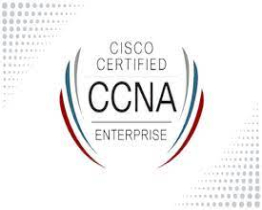
TNA Technologies Net Alliance is a Cisco Networking Academy in Pakistan. We offer CCNA Online and at Rawalpindi Branch.
The CCNA Enterprise curriculum helps students prepare for entry-level career opportunities, continuing education, and the globally recognized Cisco CCENT and CCNA certifications.
CCNA Enterprise courses are designed to take advantage of the improved flexibility and course management capabilities in the Cisco NetSpace learning environment.
Curriculum Overview:
The courses in the CCNA Version 7.0 curriculum help students develop a comprehensive foundation for designing, securing, operating, and troubleshooting modern computer networks, on the scale from small business networks to enterprise networks, with an emphasis on hands-on learning and essential career skills like problem solving and collaboration.
Career Prep:
By the end of the CCNA course series, students gain practical, hands-on experience preparing them for the CCNA certification exam and career-ready skills for associate-level roles in the Information & Communication Technologies (ICT) industry.
Learning Components:
network simulation activities
and integrity
Features:
Target Audience: Students interested in pursuing an IT-related career
Prerequisites: None. Vocational students often take IT Essentials or equivalent knowledge prior to CCNA
Course Delivery: Instructor-led
Estimated Time to Complete: 120 hours
Recommended Next Course: CCNP Enterprise Core, CCNA CyberOps, DevNet Associate, Python or Emerging Tech Workshops
CCNA: Introduction to Networks
Course Overview
The first course in the CCNA curriculum introduces the architectures, models, protocols, and networking elements that connect users, devices, applications and data through the Internet and across modern computer networks - including IP addressing and Ethernet fundamentals.
Benefits
By the end of the course, students can build simple local area networks (LAN) that integrate IP addressing schemes, foundational network security, and perform basic configurations for routers and switches.
Learning Components
Features:
Target Audience: Secondary vocational students, 2-year and 4-year college students in Networking or Engineering
Prerequisites: None
Instructor Training Required: Yes
Languages: English
Course Delivery: Instructor-led
Course Recognitions: Certificate of Completion, Letter of Merit, Digital Badge
Estimated Time to Complete: 70 hours
Recommended Next Course: CCNA: Switching, Routing, and Wireless Essentials
CCNA: Switching, Routing, and Wireless Essentials
Course Overview:
The second course in the CCNA curriculum focuses on switching technologies and router operations that support small-to-medium business networks and includes wireless local area networks (WLAN) and security concepts.
Benefits:
Students learn key switching and routing concepts. They can perform basic network configuration and troubleshooting, identify and mitigate LAN security threats, and configure and secure a basic WLAN.
Learning Components:
Features:
Target Audience: Secondary vocational students, 2-year and 4-year college students in Networking or Engineering
Prerequisites: None
Instructor Training Required: Yes
Languages: English
Course Delivery: Instructor-led
Course Recognitions: Certificate of Completion, Letter of Merit, Digital Badge
Estimated Time to Complete: 70 hours
Recommended Next Course: CCNA: Enterprise Networking, Security, and Automation
CCNA: Enterprise Networking, Security, and Automation
Course Overview
The third CCNA course describes the architectures and considerations
related to designing, securing, operating, and troubleshooting enterprise networks – including wide area network (WAN) technologies & quality of service (QoS) mechanisms for secure remote access, along with software-defined networking, virtualization, & automation concepts supporting network digitization
Benefits
Students gain skills to configure and troubleshoot enterprise networks,
and learn to identify and protect against cybersecurity threats. They are introduced to network management tools and learn key concepts of software-defined networking, including controller-based architectures and how
application programming interfaces (APIs) enable network automation.
Learning Components
Features
Target Audience: 2-year and 4-year college students in Networking or Engineering
Prerequisites: None
Instructor Training Required: Yes
Languages: English
Course Delivery: Instructor-led
Course Recognitions: Certificate of Completion, Letter of Merit, Digital Badge
Estimated Time to Complete: 70 hours
Recommended Next Course: CCNP Enterprise Core

